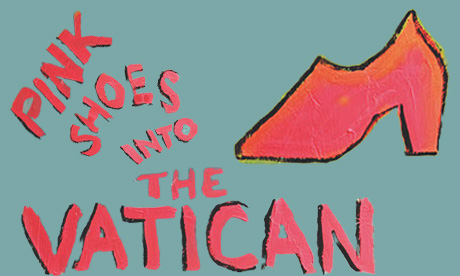Women’s role in the Catholic Church is the focus of a New Zealand group working for gender equality in Church leadership.
A media release from a group called “Be the Change, Catholic Church, Aotearoa” notes New Zealand women’s suffrage was granted on 19 September 1893, and this month’s anniversary shows the Catholic Church is 129 years behind New Zealand in recognising the leadership skills of women.
To mark the event on 18 September, Catholic women in Wellington are mounting an installation of shoes between Parliament and Sacred Heart Cathedral.
The organisers are highlighting God’s call for the Church to allow women to exercise their gifts.
They say women are often the majority of any Catholic congregation and are usually the ones organising the various tasks that need to be done at every liturgical celebration.
Yet the Catholic Church continues the injustice of refusing to recognise women’s worth by denying them equality in leadership roles, their media release says.
The shoes signify the largely unpaid work women have done for the Church throughout the ages. These contributions have been recorded in short, printed vignettes accompanying the shoes.
There will be splashes of pink, including on some of the shoes, and music, singing and speeches.
The day starts at midday with shoes being placed in a walking pattern from the steps of Parliament onto Molesworth Street, around the corner into Hill Street and across the road to the cathedral.
The event is due to finish around 2pm when the shoes will be gathered up and donated to charity.
The idea for the project came to light two years ago, but the action was postponed several times because of Covid-19 lockdowns.
The women invited Cardinal John Dew to meet them again outside the Sacred Heart Cathedral on 18 September. They would like to give him a “suffrage charter” of requests about women’s role in participation in decision-making at all levels.
With Dew in Rome, Coadjutor Archbishop of Wellington Paul Martin has responded.
Martin denied the group the opportunity to promote the event around the Archdiocese’s parishes and wrote to parishes reinforcing his decision to prevent their publicising the event.
“I appreciate your recognition of the synodal process and what has emerged as part of that, some of which supports what your group wishes to promote regarding the role of women in the authorised leadership and decision-making bodies within the Church,” he said.
“My sense is that the gathering … on the 18th has more of a focus of making a statement and furthering a particular point of view, rather than for the building up of the Church community, especially at a time when we are fragile.
“There are many ways we can celebrate the role of women in the Catholic church and also laymen over the years.
“This is something for us to do as a Church community in our own places rather than starting at Parliament and then moving to a church that is currently closed.
“I do struggle with the idea that the participation of women has been and is invisible,” Martin said.
“There are so many who do work, have worked and worshipped in our Church community, and who have made a significant contribution to the life of the Church and have served it in the way we are all called to do.
“There are many women who have leadership roles in the Wellington Archdiocese and in parishes also.
“I do not think that our church communities see them as invisible, and I know that I don’t.
“I think that is a different issue to being part of the authorised leadership and decision-making bodies within the Church,” he said.
New Zealand’s Catholic Bishops Conference (NZCBC) says six themes have emerged from the diocesan phase of the 2023 Synod on Synodality.
These are: inclusion, gathering, leadership, education and formation, mission, and synodality and change.
The leadership theme is particularly relevant to the women’s request, saying “Collaborative ministry should become the norm, with greater sacramental involvement for lay people.”
- NZ Catholic
- Supplied
- This article has been updated to include Coadjutor Archbishop Paul Martin’s publicity denial in the archdiocese. CathNews regrets the glaring omission from the original piece.
